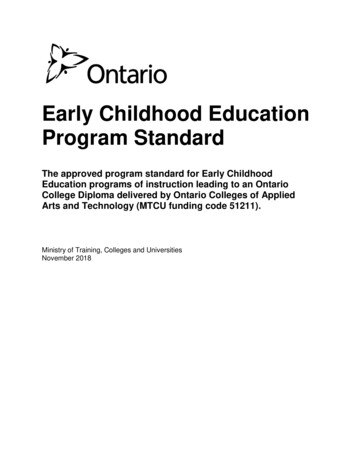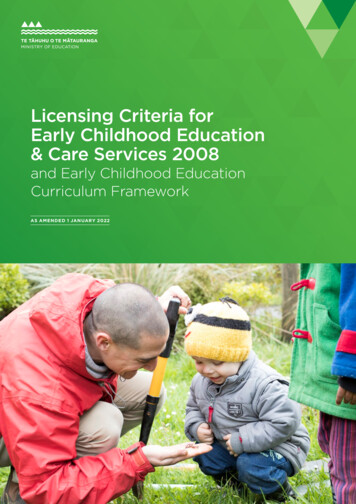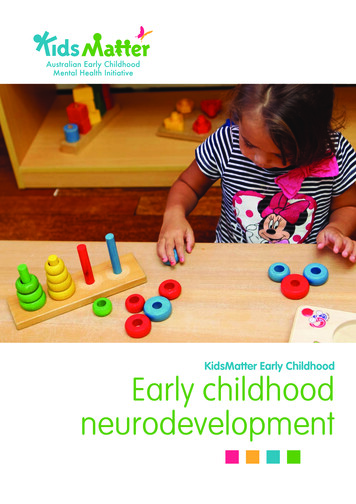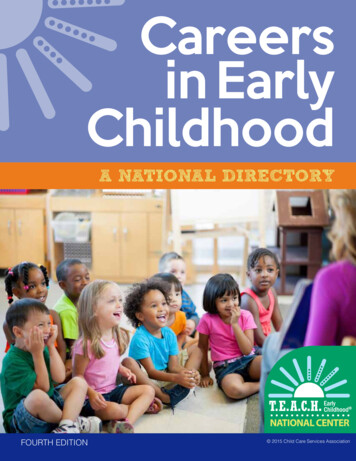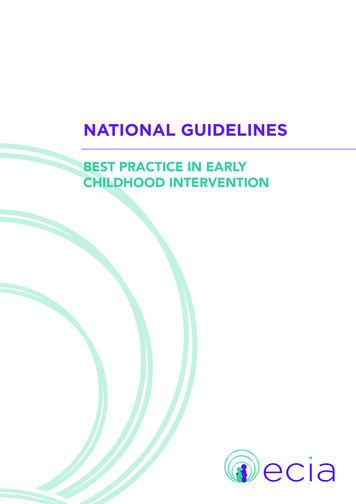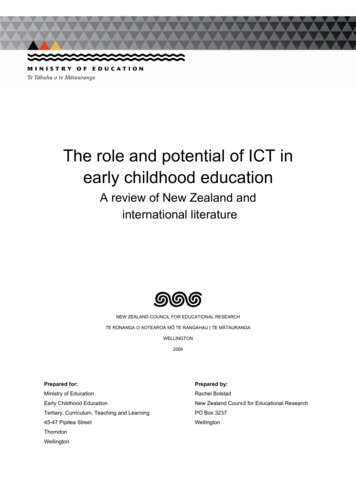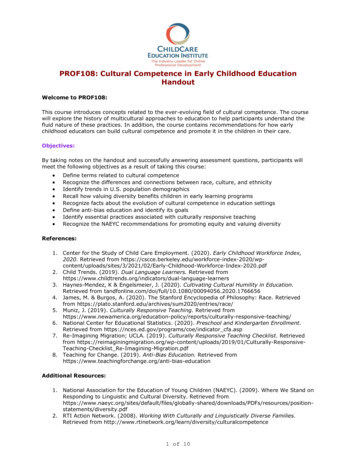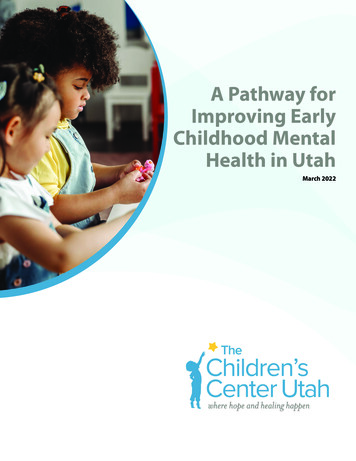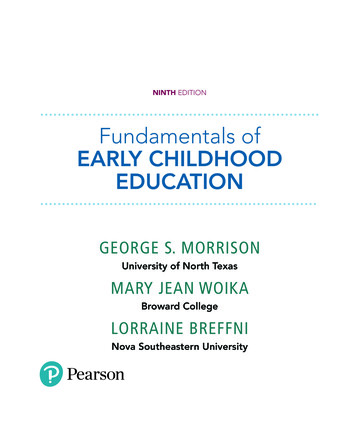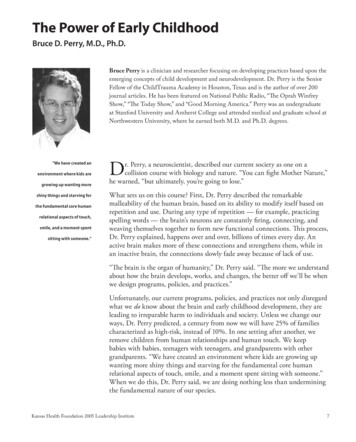
Transcription
The Power of Early ChildhoodBruce D. Perry, M.D., Ph.D.Bruce Perry is a clinician and researcher focusing on developing practices based upon theemerging concepts of child development and neurodevelopment. Dr. Perry is the SeniorFellow of the ChildTrauma Academy in Houston, Texas and is the author of over 200journal articles. He has been featured on National Public Radio, “The Oprah WinfreyShow,” “The Today Show,” and “Good Morning America.” Perry was an undergraduateat Stanford University and Amherst College and attended medical and graduate school atNorthwestern University, where he earned both M.D. and Ph.D. degrees.“We have created anenvironment where kids aregrowing up wanting moreshiny things and starving forthe fundamental core humanrelational aspects of touch,smile, and a moment spentsitting with someone.”Dr. Perry, a neuroscientist, described our current society as one on acollision course with biology and nature. “You can fight Mother Nature,”he warned, “but ultimately, you’re going to lose.”What sets us on this course? First, Dr. Perry described the remarkablemalleability of the human brain, based on its ability to modify itself based onrepetition and use. During any type of repetition — for example, practicingspelling words — the brain’s neurons are constantly firing, connecting, andweaving themselves together to form new functional connections. This process,Dr. Perry explained, happens over and over, billions of times every day. Anactive brain makes more of these connections and strengthens them, while inan inactive brain, the connections slowly fade away because of lack of use.“The brain is the organ of humanity,” Dr. Perry said. “The more we understandabout how the brain develops, works, and changes, the better off we’ll be whenwe design programs, policies, and practices.”Unfortunately, our current programs, policies, and practices not only disregardwhat we do know about the brain and early childhood development, they areleading to irreparable harm to individuals and society. Unless we change ourways, Dr. Perry predicted, a century from now we will have 25% of familiescharacterized as high-risk, instead of 10%. In one setting after another, weremove children from human relationships and human touch. We keepbabies with babies, teenagers with teenagers, and grandparents with othergrandparents. “We have created an environment where kids are growing upwanting more shiny things and starving for the fundamental core humanrelational aspects of touch, smile, and a moment spent sitting with someone.”When we do this, Dr. Perry said, we are doing nothing less than underminingthe fundamental nature of our species.Kansas Health Foundation 2005 Leadership Institute7
The Power of Early Childhood, Continued“We need to figure out howto increase the number andquality of relationships in allchildren, from high risk tono risk.”Dr. Perry’s slides showed stark contrasts in the lives of children who had beensurrounded with positive human interactions and those who were not. “Youdon’t become human just because you’re born into the species,” Dr. Perry said,“but because someone was kind with you, held you, and shared.” Alas, manychildren, materially poor as well as wealthy, suffer from forms of neglect, whichDr. Perry defined as failing to provide “a pattern of developmental experiencerequired to express a fundamental potential.”These neglectful environments have economic as well as human consequences.Diverting just one of the 300 highest-risk children in Wichita off a terribletrajectory would save 1 million before the child turns 18.Despite the dire warnings, Dr. Perry remains an optimist, believing we canchoose whether the social fabric in communities is “thin and weak like muslin,or strong as canvas.” To do so, “We need to figure out how to increase thenumber and quality of relationships in all children, from high risk to no risk,”Dr. Perry said. “The first community and culture that acts on this gift to createconsistent, nurturing, safe environments for young families and their childrenis going to see a huge quantum leap in all kinds of things and recapture 30%of dollars that could be used for the arts, infrastructure, and invention.”8Kansas Health Foundation 2005 Leadership Institute
Dr. Bruce Perry and the ChildTrauma Academy release theseimages for reproduction with the condition that the followingaccurate descriptive text is used as caption. “These images illustrate the negative impact of neglect on thedeveloping brain. The CT scan on the left is from a healthy threeyear old child with an average head size (50th percentile). Theimage on the right is from a three year old child following severesensory deprivation neglect since birth. The brain is significantlysmaller than average and has abnormal development of cortical,limbic and midbrain structures.” PROPER ATTRIBUTION OF THIS WORK: “From studies byBruce D. Perry, M.D., Ph.D. at the ChildTrauma Academy(www.ChildTrauma.org).3 Year Old ChildrenNormalwww.ChildTrauma.orgExtreme NeglectB.D. Perry, M.D., Ph.D.1
ChildTrauma Academywww.ChildTraumaAcademy.orgHOW EXPERIENCES IN EARLY CHILDHOOD CREATE A HEALTHY SOCIETYThe human brain is an amazing and complex organ that allows each of us to think, feel and act. Thequalities of humanity which have allowed us to create a democratic government, complex economies, astoundingtechnologies and all other manifestations of our current society are mediated by the human brain.In turn, these brain systems which allow us to think, feel, and act are shaped by experience. Furthermore,it is increasingly clear that the experiences of childhood act as primary architects of the brain’s capabilitiesthroughout the rest of life. These organizing childhood experiences can be consistent, nurturing, structured andenriched - resulting in flexible, responsible, empathic and intelligent contributors to society. Or, all too often,childhood experiences can be neglectful, chaotic, violent and abusive – resulting in impulsive, aggressive,remorseless, and intellectually-impoverished members of society.One set of experiences will produce tax-payers and one set of experiences will produce tax-consumers.WHAT DOES GOVERNMENT NEED TO KNOW ABOUT BRAIN DEVELOPMENT? The brain is undeveloped at birth. During the first three years of life, the brain organizes in a ‘usedependent’ way, mirroring the pattern, quality and quantity of the experiences of the infant.The root neurobiological structures for all future functioning are established in early childhood and providethe foundation for more complex feeling, thinking and behaving which develop during the rest of life.Roughly 85 % of these core brain structures are ‘organized’ by age three.Chaos, neglect and violence in early childhood result in disorganized and under-developed brains.Consistent, nurturing, predictable and ‘enriched’ experiences in a safe setting result in optimal brainorganization and function.WHY SHOULD GOVERNMENT BE INVOLVED IN EARLY CHILDHOOD? These are public health issues. Government has already decided that it is in the public interest toaggressively legislate interventions which decrease destructive and expensive health problems such asinfectious diseases. Childhood experiences have no less a critical role in determining the health andproductivity of the population - and deserve equal standing in public health policy.If programs and policies can increase the percentage of intelligent, empathic, productive members of oursociety and decrease the percentage requiring special education, mental health, child welfare, childprotective and juvenile justice services, it is clearly in the best interests of our society.HOW CAN GOVERNMENT HELP CREATE OPTIMAL EXPERIENCES FOR CHILDREN? Innovative and effective early intervention and enrichment models exist. Find out about them. Integratethem into the policy and practices that exist in your community.Demand and support high standards for day-care, foster care, education and child protective service.Support research in child development and basic neurobiology. With more knowledge will come moreefficient and effective programs – for children and adults.The major providers of early childhood experience are parents. Programs to support and strengthen thefamily will increase the likelihood of optimal childhood experiences.Integrate key principles of child development and caregiving into public education. At present we requiremore formal education and training for driving cars than for raising children. Neglect and abuse during the first three years of life can result in a lifetime of lost potential.Safety, structure, nurturing and enrichment in these first three years can result in a lifetime of productivity.
The Mismatch Between Opportunity and InvestmentSpending on Programs to “Change the Brain”Brain’s Capacity for Change03Headstart6Mental HealthPublic EducationJuvenile Justice20Substance Abuse TxAgeBruce D. Perry, M.D., Ph.D.The ChildTrauma Academy is a unique collaborative of individuals and organizations workingto improve the lives of high-risk children through direct service, research and education.A major activity of the CTA is to translate emerging findings about the human brain and childdevelopment into practical implications for the ways we nurture, protect, enrich, educate and healchildren.The "translational neuroscience" work of the CTA has resulted in a rangeof innovative programs in therapeutic, child protection and educational systems.For more information:Jana Rosenfelt, M.Ed., LPCDirector, ChildTrauma AcademyJLRosenfelt@ChildTraumaAcademy.orgWeb .orgwww.ChildTraumaAcademy.com5161 San Felipe, Suite 320The ChildTrauma AcademyHouston, TX 77056USAwww.ChildTraumaAcademy.org
Bruce D. Perry, M.D., Ph.D. Dr. Perry, a neuroscientist, described our current society as one on a . First, Dr. Perry described the remarkable malleability of the human brain, based on its ability to modify itself based on repetition and use. During any type of repetition — for example, practicing spelling words — the brain's neurons .


